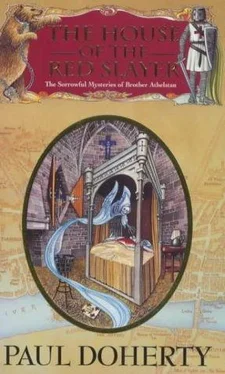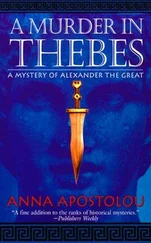Paul Doherty - House of the Red Slayer
Здесь есть возможность читать онлайн «Paul Doherty - House of the Red Slayer» весь текст электронной книги совершенно бесплатно (целиком полную версию без сокращений). В некоторых случаях можно слушать аудио, скачать через торрент в формате fb2 и присутствует краткое содержание. Жанр: Исторический детектив, на английском языке. Описание произведения, (предисловие) а так же отзывы посетителей доступны на портале библиотеки ЛибКат.
- Название:House of the Red Slayer
- Автор:
- Жанр:
- Год:неизвестен
- ISBN:нет данных
- Рейтинг книги:5 / 5. Голосов: 1
-
Избранное:Добавить в избранное
- Отзывы:
-
Ваша оценка:
- 100
- 1
- 2
- 3
- 4
- 5
House of the Red Slayer: краткое содержание, описание и аннотация
Предлагаем к чтению аннотацию, описание, краткое содержание или предисловие (зависит от того, что написал сам автор книги «House of the Red Slayer»). Если вы не нашли необходимую информацию о книге — напишите в комментариях, мы постараемся отыскать её.
House of the Red Slayer — читать онлайн бесплатно полную книгу (весь текст) целиком
Ниже представлен текст книги, разбитый по страницам. Система сохранения места последней прочитанной страницы, позволяет с удобством читать онлайн бесплатно книгу «House of the Red Slayer», без необходимости каждый раз заново искать на чём Вы остановились. Поставьте закладку, и сможете в любой момент перейти на страницу, на которой закончили чтение.
Интервал:
Закладка:
‘Brother, you will stay for some dinner?’
‘No, Sir John, I must go. Perhaps later?’
‘And the business at the Tower?’
Athelstan rose from his chair. ‘I don’t know, Sir John. Perhaps it is best if you eat and reflect on what we have already learnt. We’ll discuss it tomorrow, eh?’ He looked admiringly at the jars Lady Maude was filling. ‘You expect guests at Yuletide?’
‘I thought so, Father,’ she replied. ‘My relatives from Tiverton in Devon.’ Lady Maude threw a mock angry glance at Sir John’s snort of displeasure. ‘They were supposed to come but the roads are impassable, not even messengers can get through. I was talking to one of the aldermen’s wives. She said her husband’s trade had been badly hurt. All of his journeymen travelling to the south-west have had to turn back.’
Athelstan smiled and Lady Maude went back to her comfits. She strove to hide her agitation as Brother Athelstan informed Sir John that one of his parishioners, a Doctor Vincentius, was leaving Southwark and would not be returning. Lady Maude hid her face. She was sorry the doctor was going. He had been a most skilful man. She sighed and stared at the table. Now she would have to look around for a good physician, someone better than the usual leeches who lived round Cheapside.
Athelstan winked secretively at Cranston, made his farewells, and walked out into the darkening street. He collected Philomel from the stables of the Holy Lamb and rode back through the darkness, chuckling to himself at Sir John’s reaction to his news. He hoped Lady Maude had heard his announcement about Vincentius’ departure. Perhaps, the friar concluded, it was all for the best.
Philomel suddenly slipped on a strip of ice. Athelstan groaned in despair, dismounted and, gathering the reins in his hands, gently guided the old horse along the darkened pathway. Above him the houses rose sheer and sombre. Outside each of the great Cheapside mansions an oil lamp burned, but as Athelstan turned the corner at St Peter Cornhill and went down Gracechurch into Bridge Street, the tracks became darker. He had to pick his way carefully round the mounds of refuse, night soil and scraps of food where rats gnawed and scampered. Behind him a door slammed and a night bird nesting in the eaves of a house flew out in a burst of black feathers, making Athelstan jump. Beggars whined for alms. A whore stood on the corner, the orange wig straggling across her raddled face made all the more ghastly in the light of the candle she cradled in her hand.
She cackled at Athelstan and made a rude gesture. He sketched the sign of the cross in her direction. A city bully-boy leaning against the door of an ale-house saw the lonely figure and felt his wooden knife hilt. But when he glimpsed Athelstan’s tonsure and the crucifix round his neck, he thought better of it.
Athelstan moved on, relieved to see the soldiers in the torchlight guarding London Bridge. Its gates were closed but the city archers recognised ‘the coroner’s chaplain’, as they called Athelstan, and let him through.
The friar crossed the bridge, the sound of Philomel’s hoof beats hollow on the wooden planks. It was an eerie experience. Usually the bridge was busy but now it was silent and shrouded in a thick river mist. Athelstan had the ghostly impression of walking across some chasm between heaven and hell. The gulls nesting in the wooden arches below flew out, shrieking in protest at this unexpected disturbance. Athelstan remembered the ravens in the Tower. Another death there, he thought, two if he included the bear’s. Athelstan felt sorry for the beast.
‘Perhaps it was for the best,’ he murmured to himself. ‘Never have I seen so unhappy an animal.’ He recalled the teaching of some of his Franciscan brethren who, following the preaching of their founder, maintained all animals were God’s creation and should never be ill-treated or kept in captivity.
Athelstan passed the silent darkened chapel of St Thomas of Canterbury in the centre of the bridge. The wards-men on the Southwark bank shouted at him; some of them even wondered if he was a ghost. Athelstan sang out his name and they let him through, teasing him gently about his unexpected appearance.
The friar led Philomel through the dark alleyways of Southwark. He felt safer here. He was known and no one would dare accost him. He passed a tavern where a boy, to earn a few crusts, stood just within the doorway, sweetly singing a carol. Athelstan stopped and listened to words promising warmth and cheer. He patted Philomel on the neck. ‘Where will we spend Christmas, eh, old friend?’ he asked and walked on. ‘Perhaps Lady Cranston might invite me, now her relatives are not coming from the West Country.’
He stopped abruptly. ‘Lady Maude’s relatives!’ he murmured to the dark, quietened street, and felt a shiver go up his spine. ‘Strange,’ he murmured. ‘Something so small, a mere froth on the day’s happenings.’ He rubbed the side of his face. Lady Maude’s words stirred memories of something else he had heard.
He almost dragged Philomel back to St Erconwald’s, so eagerly the destrier snickered angrily at him. Athelstan stabled the old war horse, ensured all was well in the church, and guiltily remembered his anger earlier in the day. Bonaventura was apparently out courting so Athelstan went across to the house, built up the fire and hastily ate a piece of bread. After a few bites he tossed it into the fire as the bread was stale, and poured himself a goblet of watered wine. He cleared the rough table top and began to list all he knew about the murders in or near the Tower.
The thought which had sparked his memory in the street outside might, he speculated, be the key to resolving the entire problem. He smiled as he remembered old Father Anselm’s oft-repeated axiom in his lectures on logic. ‘If a problem exists, a solution must exist. It’s only a question of finding the path in. Sometimes it can be by the smallest chink of light.’ Anselm would then cast a beady eye on Athelstan. ‘Always remember that young Athelstan. It applies as much in the realm of metaphysics as it does to a day’s ordinary events.’
Athelstan closed his eyes. ‘I still remember that, Father,’ he murmured. ‘God rest you.’ He arranged his writing tray, marshalled his thoughts and dipped the grey goose quill into the ink, cursing when he found it was cold. He held the pot over the candle to warm it and hastily re-read the memoranda he had written when he was in the Tower. Once the ink was heated he carefully listed his conclusions.
Primo — despite being well protected, Sir Ralph Whitton had been slain in the North Bastion tower. Sir Ralph had slept behind a locked door to which he held the key, as did the guards outside. The door to the passageway in which the chamber stood was also locked; again the keys were shared with his trusted bodyguard. Yet all these precautions had been brought to nothing. His assassin had apparently entered the chamber by crossing the frozen moat and, using footholds in the Tower wall, had climbed up, unlatched the window, entered and slain Sir Ralph.
Secundo — the assassin must have known the Tower well to use these footholds, yet why didn’t the clamour of the shutters being opened, not to mention the assassin’s entry into the chamber, arouse Sir Ralph? The buckle from Sir Fulke’s boot had been found on the ice. Was this a clue to the possible murderer?
Tertio — the young man, Parchmeiner, had been the first person to try and rouse Sir Ralph but the chamber had only been opened by Master Colebrooke the lieutenant. Did Sir Ralph’s second-in-command have a role in this murder?
Athelstan gazed at what he had written, shook his head and smiled. ‘No, no!’ he whispered. ‘All that must wait.’
Читать дальшеИнтервал:
Закладка:
Похожие книги на «House of the Red Slayer»
Представляем Вашему вниманию похожие книги на «House of the Red Slayer» списком для выбора. Мы отобрали схожую по названию и смыслу литературу в надежде предоставить читателям больше вариантов отыскать новые, интересные, ещё непрочитанные произведения.
Обсуждение, отзывы о книге «House of the Red Slayer» и просто собственные мнения читателей. Оставьте ваши комментарии, напишите, что Вы думаете о произведении, его смысле или главных героях. Укажите что конкретно понравилось, а что нет, и почему Вы так считаете.












